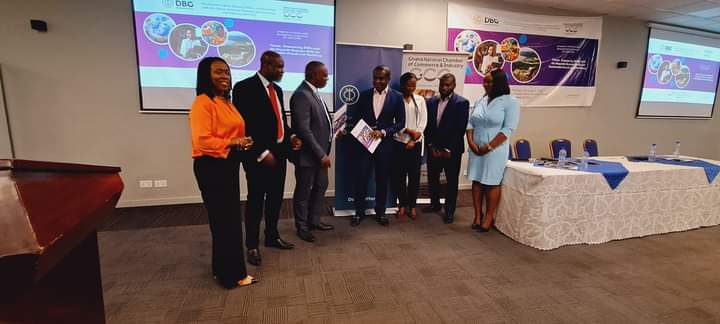By Patrick Ofoe Nudzi
Accra, Aug. 18, GNA – Some Small and Medium Enterprises (SMEs) will benefit from the first phase of a business capacity building workshop aimed at boosting the competitiveness of the private sector.
Overcoming the ravages of COVID-19, the workshop will provide the business owners and managers the needed tool to improve on their commercial operations and enable them to remain competitive.
The workshop organized by the Ghana National Chamber of Commerce and Industry (GNCCI), in collaboration with Development Bank Ghana (DBG), will train businesses to scale up their operations as well as adopt operating models that better position them to access loans from DBG’s participating financial institutions.
The workshop will be replicated and organised in five locations, Accra, Koforidua, Tarkwa, Takoradi, and Cape Coast.
Participants will have access to five pillars of the Ghana Integrated Financial Ecosystem (GIFE) digital platform which are: the SME Financial Empowerment Platform and Marketplace and Financial Trade Corridor.
Others were connected digital financing, reputational building, and equity growth.
Mr Clement Osei-Amoako, the President of GNCCI, said the SMEs contributions were critical to the sustainability of the economy as they contributed 70 per cent of the country’s GDP despite the many challenges.
“The Chamber’s rationale for this collaboration is informed by its deep insight and foresight of the persistent issues affecting the business community,” he said.
He urged member firms to maximise the unique opportunity offered by the GIFE, the digital platform within the five pillars.
He said participants were taken through Environmental, Social and Governance practices, focusing on other areas like financial management System and Accessing DBG 3-year loan / Introduction Participating Financial Institutions, Risk Management (Financial, Non-Financial, Strategic) and Marketing and Market Development Strategies.
Mr. Osei-Amoako said the contributions of the Chamber to the growth and development of the Ghanaian private sector cannot be overemphasized.
Accordingly, the GNCCI has yet again taken a bold initiative to collaborate with DBG, to first and foremost, empower its member firms with the requisite business skills to scale-up their business operations and enhance their attractiveness to access long-term capital.
He said the Chamber’s robust analytical framework that periodically mobilises business diagnostics data allowed it to document and track the growth and performance of businesses, industries, and policy institutions in Ghana.
The President said the Chamber remained dedicated to the growth and prosperity of businesses through its cutting-edge business support.
Mr Michael Mensah-Baah, the Deputy Chief Executive Officer, DBG, said small business owners often had no access to the long-term capital they needed to grow and were seen as too risky by the banks.
“Our business model allows us to leverage the networks and existing infrastructure of banks and financial institutions that partner with us to provide business advisory services and training in addition to financing,” he said.

The Deputy CEO said the DBG had designed a system to relieve the bottlenecks that had hindered the availability of long-term, competitively priced loans to Small and Medium Enterprises in Ghana.
He said, “addressing the lack of long-term financing that drives the kinds of investment that will lead to sustainable growth, is a gap that must be addressed.”
He said the Bank employed a wholesale banking model where it provided funding to eligible financial institutions to on-lend to Ghanaian businesses in targeted industry sectors.
“DBG has identified agribusiness, manufacturing, ICT, and high-value services as the catalytic sectors of the economy to focus on,” he added.
GNA